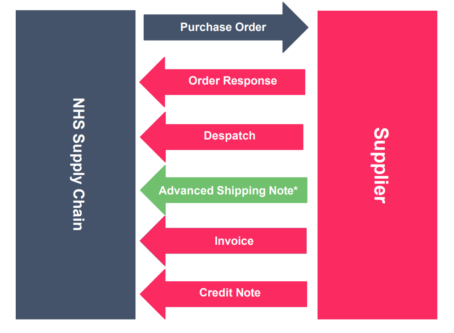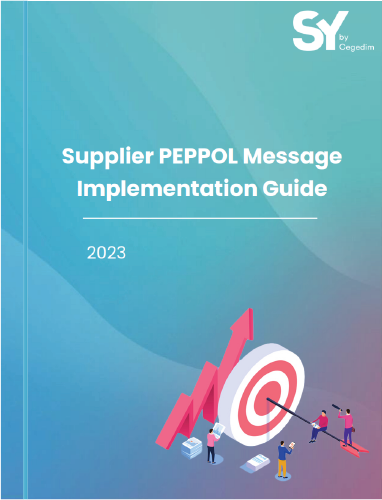In today’s fast-paced business world, efficiency and automation are paramount. For suppliers in the healthcare industry, particularly those dealing with the NHS Supply Chain, adherence to electronic messaging standards is essential. This guide will walk you through the PEPPOL (Pan-European Public Procurement On-Line) Implementation Guide for NHS Supply Chain, explaining its significance, benefits, and key components.
Understanding PEPPOL
PEPPOL, integrated into the NHS Scan4Safety Strategy, is a game-changer for suppliers. It is a framework of electronic documents, paired with specific business rules and processes, aimed at revolutionising the efficiency and administration of trading relationships. The core objective of PEPPOL is to replace manual processes and paper documents with electronic alternatives, promoting automation. Five vital documents related to ordering, delivery, and payment form the heart of PEPPOL’s functionality.
Key Benefits of PEPPOL
Before delving deeper, it’s essential to grasp the potential benefits of implementing PEPPOL within the NHS Supply Chain:
- Reduction of order processing lead time
- Cost reduction through process optimization
- Administrative cost cuts
- More accurate order placement
- Elimination of redundant manual data input
- Shorter business cycles
- Reduced manual work required
These advantages underline the importance of PEPPOL for healthcare suppliers and their collaboration with the NHS Supply Chain.
PEPPOL Document Overview
The core of PEPPOL’s efficiency lies in a suite of electronic documents that streamline the purchasing process. The diagram below illustrates the sequence of these documents in a typical purchase order to invoice transaction:

Notably, the Advanced Shipping Note (ASN) message replaces the need for suppliers to send a Despatch Advice message for delivery confirmation. The NHS Supply Chain solution automatically generates the Despatch Advice (Confirmation) upon receiving an ASN document.
NHS Supply Chain supports the implementation of the following messages:
- NHS Supply Chain Purchase Order
- Supplier Order Response
- Supplier Advanced Shipping Notification (ASN)
- Supplier Despatch Advice (Delivery Confirmation)
- Supplier Invoice
- Supplier Credit Note
Each document serves a specific purpose within the procurement process and will be explained in detail in later sections.
Types of PEPPOL Orders
PEPPOL Order messages from NHS Supply Chain come in three different types:
- eDirect
- Blue Diamond (Cross-Dock)
- Stock
Each type may contain varying data, primarily related to label information and batch/serial numbers. Understanding these differences is crucial for seamless integration with PEPPOL.
eDirect Orders
eDirect orders allow changes in delivery dates and quantities, with certain constraints. Delivery dates must not be in the past or for the current day, necessitating timely order amendments.
Blue Diamond (Cross-Dock) Orders
Blue Diamond orders allow suppliers to amend quantities, but delivery dates cannot be changed. Any attempts to alter the delivery date for these orders will be disregarded.
Stock Orders
For Stock Orders, suppliers can send Order Response messages to amend quantities. While this is not mandatory for Stock Orders, it offers flexibility and is particularly valuable if the supplier’s systems support it.
Order Responses and Amendments
Order Responses, sometimes referred to as Amendments, are used to modify orders. They serve to streamline the process and reduce the need for manual interventions via the NHS Supply Chain Supplier Portal.
Advanced Shipping Notification (ASN)
One of the critical components of PEPPOL is the Advanced Shipping Notification (ASN). This section outlines the mandatory requirements for successful shipment into or on behalf of the NHS Supply Chain.
ASNs are required for all order types and are particularly vital for items falling under the European Medical Device Regulation (MDR) legislation. These notifications provide crucial handling unit information, including Pallet, Cage, or Carton details. They must accurately represent the shipped items and their hierarchy within each handling unit.
Serial Shipping Container Code (SSCC)
The Serial Shipping Container Code (SSCC) is an 18-digit identifier used to track logistics units. NHS Supply Chain mandates the use of SSCC codes on ASNs and Shipping Labels. It is essential to encode SSCCs in a barcode (GS1-128) on Shipping Labels for efficient automation.
In conclusion, the PEPPOL Implementation Guide for NHS Supply Chain is a transformative initiative designed to enhance efficiency and reduce administrative burdens for suppliers. Embracing electronic documents and automation not only streamlines the procurement process but also aligns with the broader goals of the NHS Scan4Safety Strategy. Suppliers who adapt to these changes stand to benefit from reduced lead times, cost savings, and more accurate order processing. Understanding the different order types and the role of Order Responses and Advanced Shipping Notifications is vital for seamless integration into the PEPPOL framework. By adhering to these standards, suppliers can contribute to a more efficient and effective healthcare supply chain for the benefit of all stakeholders involved.

Are you looking to connect to NHS Supply Chain?
Download a copy of the NHS Supply Chain Message Implementation Guide:
Enter your details below:
"*" indicates required fields

